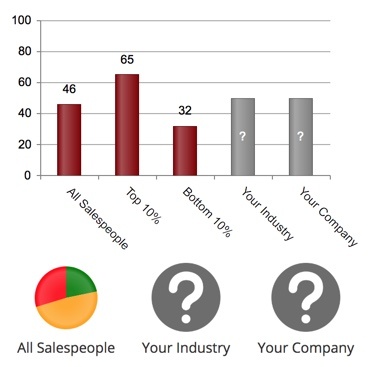- May 7, 2018
- Posted by: Dave Kurlan
- Category: Understanding the Sales Force

Whichever way you turn, wherever you look, and whatever you listen to there is data. Polls, surveys, metrics, analytics, analyses, white papers, graphs, charts, infographics, tables, spreadsheets and more. There is data everywhere. 5 of my last 10 articles were based on data and I know that my regular readers love the articles that are based on data so I am writing about data again today.
Objective Management Group (OMG) recently expanded the Consultative Seller competency which represents 1 of the 21 Sales Core Competencies.
I took a look at the first thousand rows of data that came through and made some more cool discoveries that I will share below.
Let’s start with the Consultative Seller Competency. As you can see in the image below, the average score for all salespeople is 44%, which means that the average salesperson possesses fewer than half of the necessary attributes of the Consultative Seller. As you can see from the green slice of the pie chart below, only 22% of all salespeople have this competency as a strength. Even the top 10% of all salespeople only score an average of 65%. This is the competency where most salespeople are the crappiest.

The question is why are most salespeople so ineffective at this competency? If they aren’t being professionally trained and coached, that would explain a lot of the bad scores because only around 7% of all sales managers are capable of providing the kind of coaching that would help their salespeople become effective consultative sellers. I’m guessing that even some outside trainers and coaches aren’t effective enough to move the needle on this competency. But there is more to this than meets the eye. Let’s look at what happens when salespeople are being effective versus ineffective at consultative selling.
Please look at the next image below.

These 3 pie charts show how effective these 1,000 salespeople are at uncovering issues by looking at 3 specific sales process milestones:
- Whether reasons to buy are uncovered or not
- Whether those reasons are actually compelling enough to buy or they only created interest
- Whether the salesperson created enough urgency so that the prospect must buy or it was simply nice to have.
This tells us A LOT!
While 84% of these B2B salespeople are able to uncover business issues or reasons, only 33% are able to continue asking questions long enough to uncover compelling reasons to buy as shown in the second pie chart. There is an enormous difference between a business issue and a compelling reason to buy something to solve it. As you can see from the third pie chart, uncovering business issues leads to a condition where 73% of prospects find the offering is simply nice to have, while 12% of these salespeople leverage those compelling reasons to a condition where prospects must have the solution. There is a huge difference between nice to have and must have.
Consider this recent article on reaching decision makers where the data showed that only the opportunities where salespeople met with the actual decision makers reach the proposal ready and closable stages. We have a similar scenario here where the salespeople who uncover compelling reasons to buy are 56% more likely to move their opportunities to the proposal ready and closable stages.
This huge selling gap can be fixed but it isn’t one of the easy ones. Uncovering compelling reasons to cause prospects to believe they must have your solution requires advanced active listening and questioning skills, as well as Sales DNA to support its use. The best trainers, coaches and consultants who offer their expertise in this area agree that it will usually take 8-12 months for a sales team to make the transition from where they are today to the kind of selling I described above. However, the return on that investment of time and money is amazing! When salespeople are finally able to sell in this manner, sales always sky rocket!
